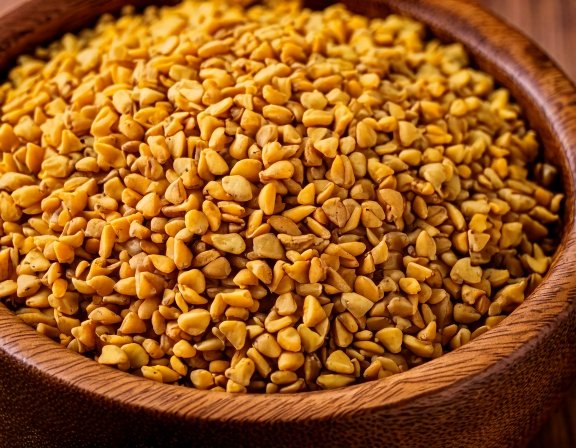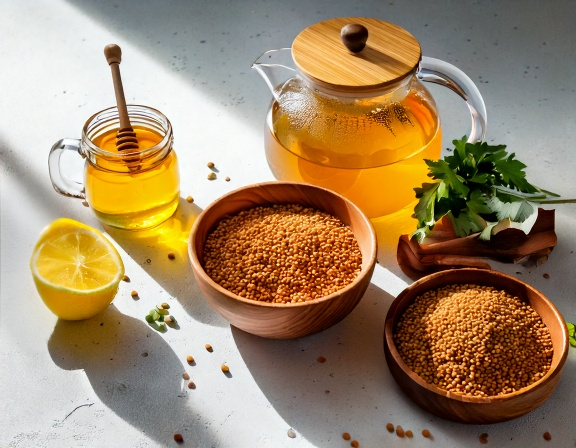Fenugreek Seeds for Women: How to Grow & Use This Hormone-Balancing Herb

Women’s Metabolism & Hormone Helper (PDF)
14-day plan with recipes, hormone-balancing tips, and natural supports—including fenugreek! Start your wellness reset.
Download Now
Fenugreek seeds (Trigonella foenum-graecum) are an ancient medicinal and culinary herb used in women’s health for centuries. From hormone balance to beauty and digestive support, fenugreek stands out as a multipurpose botanical for the modern wellness routine.
This post covers expert tips on growing and harvesting fenugreek at home, plus a practical science-backed guide to how fenugreek supports energy, hormones, lactation, and beauty in women of all ages.

Growing fenugreek at home is easy, rewarding, and ensures you get the freshest leaves and seeds for kitchen or wellness use. Fenugreek thrives in small garden beds, patio containers, and even indoor pots—making it an ideal choice for beginners and urban gardeners.
How to Plant and Grow Fenugreek
Fenugreek (Trigonella foenum-graecum), also known as methi, is a fast-growing annual herb valued for both its nutrient-rich leaves and aromatic seeds. Easy to cultivate in garden beds or containers, it thrives in warm, sunny conditions and offers continuous harvests throughout the season. With minimal care, you can enjoy a steady supply of tender greens and flavorful seeds for cooking and wellness blends.
Soil
Plant in well-drained, fertile soil with a neutral pH (6.0–7.0). Loosen the soil before planting and enrich it with compost or aged manure to promote healthy root development. Avoid heavy, clay soils that retain excess moisture.
Light
Choose a full-sun location for optimal growth and seed production. Fenugreek loves warmth and light—6 to 8 hours of daily sun ensures strong, fragrant plants with high yields.
Sowing
Directly sow seeds outdoors after the last frost, or start indoors in small pots for an early harvest. Plant seeds about ¼ inch deep and space them 2–3 inches apart. For dense leaf harvests, broadcast seeds closely in a shallow bed and thin lightly once seedlings appear.
Watering
Keep the soil consistently moist but never soggy. Water at the base of the plants to prevent mildew on leaves. Fenugreek’s shallow roots need regular watering, especially in hot, dry conditions.
Harvesting Greens
Harvest young leaves (known as methi) about 3–4 weeks after sowing. Snip tender stems just above the soil line for salads, soups, and stir-fries. The plants will regrow for another round of greens before flowering.
Seed Harvest
For seeds, allow plants to mature fully—pods form about 90–110 days after planting. When pods turn golden-brown, cut them and dry in a warm, airy spot before collecting the seeds.
Quick Growing Tip
Succession sow every 2–3 weeks to enjoy continuous leafy harvests and a steady supply of seeds. Fenugreek’s quick growth and nitrogen-fixing properties also make it an excellent companion or soil-enriching crop for your garden.
Quick Growing Tip: Succession sow every 2–3 weeks for continuous greens and steady seed harvests.Ageless Energy Solution: Restore Balance Naturally
- Focuses on nutrition, gentle movement, and food-based stress relief
- Tips and protocols for hormone and energy balance—no fad diets
- Great for adults seeking natural support for mood and metabolism
How and When to Harvest Fenugreek Seeds
Fenugreek seeds are ready to harvest when the pods have turned a golden-brown hue and the plant begins to dry naturally. Timing the harvest correctly ensures maximum flavor, aroma, and medicinal potency. Typically, seeds mature about 90–110 days after planting, depending on climate and growing conditions.
How to Harvest
Once most of the pods have dried on the plant, uproot the entire fenugreek plant and hang it upside down in a cool, dry, and well-ventilated space. Allow it to dry completely for 7–10 days. When the pods are crisp and break easily, gently shell or rub them between your hands to release the golden seeds.
Cleaning & Finishing
After threshing, remove any debris or chaff and spread the seeds on a clean surface for another day or two of air drying. This step ensures there’s no residual moisture, which could lead to mold during storage.
Storage
Once fully dry, store fenugreek seeds in airtight glass jars or tins, keeping them away from direct sunlight, heat, and humidity. Properly stored seeds maintain their aroma, bitterness, and potency for up to one year or longer.
Storage Tip
For best preservation, label each jar with the harvest date and store in a cool, dark pantry. Whole seeds last longer than ground ones—grind only as needed for cooking, tea blends, or herbal preparations.
Quick Note: Fenugreek seeds become more aromatic as they age slightly—perfect for spicing curries, infusions, or homemade tonics for digestion and hormone balance.


What makes fenugreek seeds unique for women’s wellness? Modern science confirms many of the traditional uses of fenugreek for hormone support, digestion, and beauty. Below are the primary ways fenugreek benefits women at every life stage.
Fenugreek for Women’s Health: Why It Works
Fenugreek (Trigonella foenum-graecum) has been treasured for centuries in traditional medicine systems—from Ayurveda to ancient Mediterranean practices—for its ability to nourish, balance, and restore women’s health at every stage of life. Its unique blend of phytoestrogens, minerals, and fiber supports hormone regulation, digestion, and overall vitality, making it a true multi-purpose herb for daily wellness.
Support Hormonal Balance
Fenugreek contains natural phytoestrogens and steroidal saponins that may help ease PMS, menstrual cramps, and perimenopausal symptoms. By gently influencing hormone metabolism, fenugreek can support mood steadiness, reduce bloating, and encourage cycle regularity—especially when used consistently as tea, seeds, or capsules.
Boost Lactation
Traditionally recognized as a galactagogue (a herb that promotes milk production), fenugreek supports healthy breast milk supply in nursing mothers. Its mild, nutty flavor is often infused in teas or added to soups for postpartum nourishment and energy replenishment. Always consult a healthcare provider before use while breastfeeding.
Support Blood Sugar & Digestion
Fenugreek’s soluble fiber and alkaloids help stabilize blood sugar levels and improve digestion. It soothes bloating, supports liver function, and encourages gentle detoxification—especially beneficial for women managing energy fluctuations or sugar cravings during hormonal shifts.
Enhance Beauty & Hair Health
Rich in iron, protein, and mucilage, fenugreek is a secret ingredient for glowing skin and strong, shiny hair. Its anti-inflammatory and antioxidant properties help soothe scalp irritation and promote healthy growth. When used in face masks or hair rinses, it hydrates deeply and restores natural luster.
Quick Tip: Soak fenugreek seeds overnight, blend into a paste, and apply as a scalp mask or skin pack once a week to strengthen hair, balance oil, and refresh the complexion naturally.
Thyrafemme Balance: Adaptogenic Plant Blend for Women
- Features adaptogens: Ashwagandha, Rhodiola, Lemon Balm, Kelp/Iodine, Schisandra
- Plus selenium, zinc, L-tyrosine for full-spectrum hormone support
- No synthetic hormones—just time-tested botanicals and minerals
How to Take and Use Fenugreek
Fenugreek is one of the most adaptable herbs you can add to your wellness routine. Its earthy, slightly sweet flavor pairs beautifully with food, while its nutrient-rich seeds and leaves provide internal and external benefits for digestion, hormones, and skin health. Start with small amounts, stay consistent, and listen to how your body responds for best results.
Tea
Steep 1–2 teaspoons of fenugreek seeds in hot water for 5–10 minutes. Strain and sip daily to support digestion, hormonal balance, and metabolic health. For added benefit, combine with cinnamon, fennel, or ginger to enhance flavor and synergy.
Soaked Seeds
Soak fenugreek seeds overnight in warm water and chew them the next morning. This traditional method supports gut health, balanced blood sugar, and hormonal comfort. The softened seeds are mildly bitter but highly restorative and cleansing.
Powder
Add ½–1 teaspoon of fenugreek powder to curries, smoothies, or yogurt. The powder’s gentle bitterness complements savory dishes and provides a daily source of fiber, minerals, and plant compounds that nourish from within.
Topical Uses
Mix powdered fenugreek seeds with coconut oil, yogurt, or aloe gel to create a soothing hair or skin mask. Apply to the scalp to strengthen follicles and reduce dandruff, or to the skin to calm inflammation and promote smoothness. Rinse after 15–20 minutes.
Safety Note
Fenugreek is generally safe in culinary amounts, but because it can influence hormones and blood sugar, those who are pregnant, diabetic, or on medication should consult a qualified healthcare provider before taking it in supplement form.
Quick Tip: Combine fenugreek with maca or shatavari for women’s hormonal wellness, or with ginger and turmeric for a metabolism-boosting tonic that supports energy and digestive strength.
How to Use Fenugreek
- Tea: Steep 1–2 tsp of fenugreek seeds in hot water for 5–10 minutes. Sip daily or as needed for hormonal and digestive balance.
- Soaked Seeds: Soak overnight; chew a few seeds in the morning to support digestion, lactation, and hormone health.
- Powder: Add fenugreek powder to curries, smoothies, or yogurt for an earthy flavor and nutrient boost.
- Topical: Mix powdered seeds with coconut oil or yogurt to create nourishing hair and skin masks that promote shine and soothe irritation.
Safety Note: Fenugreek is generally safe in culinary amounts. If pregnant, diabetic, or on medication, consult your healthcare provider before supplementing regularly.

Did You Know?
Fenugreek is known as “methi” in India and is one of the few herbs where both the seeds and fresh greens are equally prized in women’s wellness traditions. Research shows its unique compounds (such as diosgenin and galactomannan) may contribute to hormonal balance and healthy metabolism.
Ready to Grow Your Own Women’s Wellness Garden? Subscribe to Health Intel Daily for expert herbal guides, women’s health tips, and more delivered right to your inbox!
Subscribe for Herbal Wisdom & Women’s Wellness!Related Reads:
References
- Ulbricht, C. et al. (2007). Fenugreek (Trigonella foenum-graecum): An evidence-based systematic review by the Natural Standard Research Collaboration. Journal of Herbal Pharmacotherapy, 7(3-4), 143–177.
- Herman, P.M. et al. (2020). Botanical Dietary Supplements for Women’s Health: A Review. American Journal of Obstetrics & Gynecology.
- National Center for Complementary and Integrative Health (NCCIH). Fenugreek Overview.